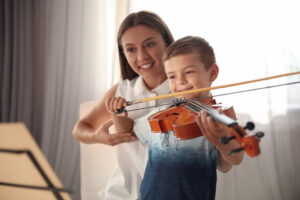If your child is drawn to string instruments but you’re unsure where to start, you’re not alone. We’re often asked: “Should they play violin? Or is cello better? What’s the difference between viola and bass?”
As a team of private music teachers, we’ve helped hundreds of families navigate this decision. So we created this simple, step-by-step guide to help you begin the process of choosing a string instrument for kids—based on your child’s personality, physical size, and musical goals.
Step 1: Consider Your Child’s Size
String instruments come in different sizes—and some are simply better suited to smaller bodies.
- Violin – Smallest and lightest; great for young beginners (ages 5–7+)
- Viola – Slightly larger and deeper in tone; ideal for ages 8+ with longer arms
- Cello – Played seated; good for kids who want a rich, lower sound and can manage a larger instrument (ages 6–8+)
- Bass – Largest string instrument; often recommended for older children or those with taller builds (usually ages 10+)
Step 2: Think About Sound and Role
Ask your child what kind of sound they like and how they want to “fit” in an ensemble.
- Violin – Bright, high-pitched; often plays melody
- Viola – Mellow, deeper than violin; plays inner harmonies
- Cello – Warm, resonant; often plays bass line or rich solos
- Bass – Deepest tones; anchors rhythm and harmony in ensembles
Step 3: Explore Personality Fit
We’ve noticed students often match naturally with certain instruments:
- Energetic and outgoing? Violin may be the perfect fit.
- Quiet and thoughtful? Viola or cello might resonate.
- Likes structure and rhythm? Bass players often shine in groove-based roles.
Still unsure? Many teachers offer trial lessons to explore the options—and help your child decide by playing each one. Check out our post on how younger students succeed in online lessons for more ways to support early exploration.
Step 4: Talk to Your Teacher
Our number one recommendation? Ask your teacher. They’ll consider:
- Your child’s hand size, arm length, and coordination
- Their musical preferences and focus level
- Your goals (casual learning vs. orchestra participation)
They may even help you size and rent an instrument from a local shop. If you’re starting the rental process, Music & Arts offers reliable beginner options for all string instruments.
FAQ: Choosing a String Instrument
Is one string instrument easier than the others?
Not necessarily. Violin has trickier pitch placement early on, while cello and bass require more physical coordination. The right fit depends on the student—not just the instrument.
Can my child switch later?
Absolutely. Many students start on violin or cello and switch as their preferences evolve. Skills transfer well across the string family.
Should we rent or buy?
Renting is best for beginners, especially younger children who may outgrow their instrument or switch. Your teacher can guide you on when (or if) to purchase.
